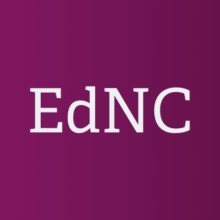

The Institute for Emerging Issues (IEI) at NC State University today announced the selection of Catawba, Chowan, Randolph and Rockingham Counties for participation in KidsReadyNC, a new, 18-month initiative designed to help selected Tier 1 or Tier 2 communities strengthen leadership capacity within their local early childhood development systems.
Funded in part by grants from The Belk Foundation and The Duke Endowment, selected communities will receive tools and technical assistance, and will participate in a peer-learning process all designed to boost capacity and improve outcomes for
children and families.
“Thanks to a lot of hard work by early childhood experts, there’s tremendous energy and awareness in North Carolina about the importance of early childhood investments for our state’s economic future, but under-resourced communities need to find new strategies if they are going to do everything they can for our children,” said IEI Director Leslie Boney. “Through this partnership of IEI with investors, state and national experts and communities, we think we will find solutions and approaches that can help Tier 1 and 2 counties across the state.”
In partnership with the Frank Porter Graham Child Development Institute (FPG), the initiative builds upon the “kidonomics” theme featured at the 2018 Emerging Issues Forum.
“We are excited to forge new partnerships with multi-sectorial stakeholders and organizations, including projects like KidsReadyNC that extend across Universities and bridge to communities,” said FPG Director Ayse Belger. “The expertise and engagement of specialists like Laura Louison and Oscar Fleming from the FPG National Implementation Research Network (NIRN) will strengthen the capacity of communities to deploy best practices.”
KidsReadyNC pilots an early childhood system capacity-building model delivering stateof-the-art technical assistance with a more modest funding commitment from the community and outside funders. It is a lower-cost model designed to produce positive outcomes for the participating communities while creating strategies and successes that other similar communities can draw upon in the future. Each site will identify one of seven “measures of success” identified by NC Pathways to Grade-Level Reading stakeholders as priorities for action.
Technical assistance providers will work with each participating community on key focus areas, including a community-specific planning process, support for initial implementation efforts, and cross-community convenings to focus learning and build supportive relationships.
“The Forum for Youth Investment is excited to dig in and support innovative strategies in lower-resourced North Carolina communities that bring leaders together to improve early childhood outcomes,” said The Forum for Youth Investment Senior Fellow Elizabeth Gaines.
KidsReadyNC technical assistance providers include:
- Janice Gruendel, Ph.D., M.Ed., Research Professor, College of Health and Human Services, University of North Carolina Charlotte; Senior Fellow, Institute for Child Success; Fellow, Zigler Center in Child Development, Yale University
- Laura Louison and Oscar Fleming, National Implementation Research Network, Frank Porter Graham Child Development Institute
- Elizabeth Gaines and Alicia Wilson-Ahlstrom, The Forum for Youth Investment
Community submissions were evaluated on their early childhood leadership and programmatic efforts, unique challenges and opportunities, and a financial and staffing resource commitment to the initiative.
“All of the applicant communities presented compelling opportunities,” said IEI Assistant Director Patrick Cronin. “The four KidsReadyNC communities were chosen because each has the right mix of assets and is fully committed to a community-driven leadership approach to improving early childhood development outcomes.”
Selected KidsReadyNC Communities:
- Catawba (Catawba Partnership for Children)
- Chowan (Chowan CARES)
- Randolph (Inspired Randolph Collaborative)
- Rockingham (Rockingham Partnership for Children)
More information about KidsReadyNC is available at emergingissues.org.


